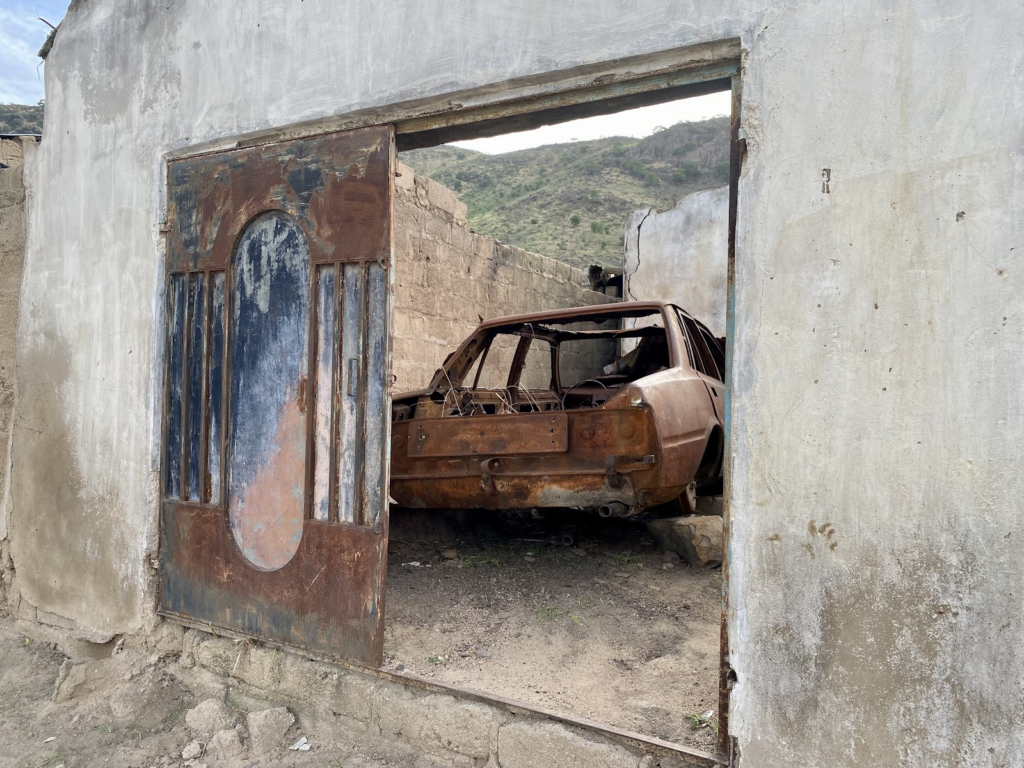These Are Our Reporters’ Personal Favourites Of 2023
It has been a fine year for journalism. We asked our reporters to choose one favourite out of all the stories they wrote this year and to tell us why. Here are their responses.

- UCH: Federal Workers In Nigerian Hospital Not Paid In 34 Months

“A few days after the report on the hardship faced by non-clinical staff of the University College Hospital (UCH), a federal teaching hospital under the University of Ibadan, Nigeria’s Ombudsman, the Public Complaints Commission (PCC) and the House of Representatives moved to intervene in the matter. Sources affected have also told HumAngle that they have been contacted and told that their payment would be made soonest. The impact of the report made it one of my favourites for the year.” – Adejumo Kabir, Bureau Chief, Southern Operations.
2. Into The Abyss Of Deaths, Burials, And Missing People In Nigeria’s War On Terror

“This was a good year. My articles had what some would call r-a-n-g-e. I wrote about events in different countries, on a broad spectrum of issues, and using all kinds of formats. But at the zenith of my journalism in 2023 sits Into The Abyss, an investigation into the disappearances of thousands of people in northeastern Nigeria owing to the actions of state forces who are fighting Boko Haram insurgents. The project took about ten months and is one of the most important things I’ve ever done because of the sheer scale of injustice and grief it documents. I have also received tons of great feedback from my editors and people who read the article about the quality of the storytelling. Some say it’s given them hope of what could be achieved in the local media space, that it’s raised the bar. This is what I live for: not just to blur but to entirely erase the lines between foreign and local journalism, such that when you move from the pages of one to the other, you are not mentally preparing yourself for a sharp drop in quality.” – ‘Kunle Adebajo, Investigations Editor.
3. Kaduna Shia Protest Killings: Families Mourn Death Of Six Young Men.

“This feature is my favourite mainly because I like the fact that I was able to interview family members of all those killed during the protest. It’s not every time a reporter gets to achieve that. Also, I was able to see and smell the place where it happened and talk to their loved ones at their homes in real-time as they mourned. Biking around was exhilarating. Talking to them was heartbreaking.” – Nathaniel Bivan, Features Editor.
4. Terrorists Kill Medical Worker In Nigeria After Collecting Ransom Thrice

“I like the feature because of the uniqueness of its angle. It tells the story of a medical worker who went to work in a rural area in North West Nigeria, only for his family to later learn he had been kidnapped by terrorists. The terrorists collected ransom on three different occasions from his family and still killed him.
It’s a sad story, but I think it’s my best because it shows despite the economic hardship families are subjected to to raise ransom for their loved ones, freedom isn’t guaranteed. It also shows the deceitful nature of the negotiation process with these armed groups.” – Muhammad Garba, Humanitarian Reporter.
5. Anxious And Divided: The Human Impact Of Nigeria-Niger Border Tensions

“It’s my favourite because it has given me a new perspective on how complex and interconnected the border communities between Nigeria and Niger have been. It has also given me the experience of working at a risk area during a volatile situation.” – Aliyu Dahiru, Assistant Editor, Radicalism and Extremism desk.
6. Kirawa: A Borno Community Expected Rain, But Bullets Fell Instead

“This is one of my best stories this year because I have presented it to my audience in writing and video documentary forms. I was face to face with environments destroyed by terrorists and I toured the community to feel, touch, and smell what it means to be at the centre of armed disastrous conflict. It is a story that gives accounts of the victims of over a decade of humanitarian crises as a result of the Boko Haram conflict in the Lake Chad region. For the first time, I spent a week in a location most affected by the conflict. It is the story of Kirawa community that has been desolate for about nine years, its people were resettled and I visited them one year later to assess their living conditions. The story has been successful because the state government and stakeholders across the country have intervened in various ways by providing basic facilities that I have reported missing in the community as a result of accountability issues.” – Usman Abba Zanna, Multimedia Reporter
7. ‘Unwrapped Lollipops:’ The Consequences Of Purity Culture Are Far Reaching For Women

“It’s my favourite story of the year because it not only talks about a taboo topic but also shows the many ways it has sunk its sharp claws into the lives of women, making it hard to simply be a person sometimes. And this, too, is a human rights emergency.” – Hauwa Abubakar Saleh, Reporter.
8. Gold, Livestock And Bikes: How Abductees Paid Ransoms During Nigeria’s Cash Crunch

“I liked this story because it explores the plights of victims captured by terrorists during Nigeria’s cash crunch.” – Ibrahim Adeyemi, Assitant Investigations Editor.
9. Social Media Is Helping Nigerian Women Discover A Lesser-Known Premenstrual Disorder

“My favourite story/report this year has to be the recent one I wrote on PMDD. If we are talking about storytelling technique or impact, it wouldn’t be my favorite but I particularly love that report because I’ve had times in my life when I questioned my sanity when in fact it had been my period all along. I love that report because it makes me feel seen and I know it would do the same for the women who will go on to read it.” – Chigozie Victor, Gender Reporter.
Our non-writing staff had some favourites too
10. Turning Grief Into A War Cry: The Women On The Frontlines Against Boko Haram

“You’ve heard about the gallant soldiers fostering on in the fight against Boko Haram. You have also heard about the vigilantes and community efforts to remove the roots of war in various communities in the Northeast. I bet you haven’t heard of the women involved in this fight. The history of ancestral scars of battle passed on to some women. The revenge that some other women swore to inflict on their bringer of countless pain. This story is special. This story is about the women that fight.” — Anthony Asemota, Multimedia Editor
11. Four Years After Big Launch, Borno’s School For Displaced Children Still Under Lock

“First off, it’s my favourite because it was written well and detailed. I love the first paragraph, it was what made me dwell on the story. (It gave me a novel kind of vibe) and of course, it was written by one of my favourite authors. I also like that it wasn’t long or a boring read, it highlighted the issues and hopefully, it would get to the right authority so something can be done about it.” — Rukayya Saeed, Graphics Designer.
12. ‘Hello, My Love’: Giwa Barracks Detainees Finally Allowed To Make Phone Calls

“The Knifar movement is one that’s been extensively covered by HumAngle. The first story I ever read from HumAngle was about them. They’ve been through so much. Recieving phone calls from loved ones are something we definitely take for granted, but for some of these women, it was finally knowing that their loved one was still alive years after capture. This story touched me so much because it showed the impact of telling minority stories, the renewed hope for some, and the long road ahead for justice for all the families involved.” – Damilola Lawal, Curator, HumAngle+
13. What Goes On In The Mind Of A Terrorist Woman?

“It is such an audacious story because we have seen women as victims, we have seen women as survivors, but we rarely see women as perpetrators, capable of equal terror.” – Shade Mary-Ann Olaoye, Assistant Audience Engagement Editor
Support Our Journalism
There are millions of ordinary people affected by conflict in Africa whose stories are missing in the mainstream media. HumAngle is determined to tell those challenging and under-reported stories, hoping that the people impacted by these conflicts will find the safety and security they deserve.
To ensure that we continue to provide public service coverage, we have a small favour to ask you. We want you to be part of our journalistic endeavour by contributing a token to us.
Your donation will further promote a robust, free, and independent media.
Donate HereStay Closer To The Stories That Matter




